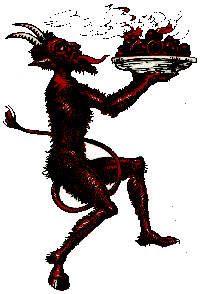
|
THE |
|
a cache of usenet and other text files pertaining
to occult, mystical, and spiritual subjects. |

|
THE |
|
a cache of usenet and other text files pertaining
to occult, mystical, and spiritual subjects. |
To: alt.magick.tyagi,alt.magick
From: tyagi@houseofkaos.abyss.com (mordred)
Subject: Re: How About Some Kabbalah Discussion?
Date: Kali Yuga 49950129
Quoting: |mek@cypress.cb.att.com (Mark Kagy x3636 1E-331 (nq8230100))
|I guess, over all, I am trying to grasp exactly what constitutes Kabbalah,
See the alt.magick Kabbalah FAQ for the most traditional and probably
conservative response. Some would say it was the *only* answer, but they
are the ones who have sealed shut their minds from the Darkness of the
Void.
The QBL is another divination system among many. It is apparently part of
a mystical system of Jewish origin, and it can be quite complex when viewed
from this perspective. The study of the Hebrew alphabet and mythotypes is
imperative to a study from this angle.
However, there are those who feel that there is a more generic (liberated?)
sense in which QBL may be used. It is the reflection upon the Perfect Self
which allows us to further introspect if we but take the time to use it to
our purposes. This is why the 'Qabalah' developed within Hermetic studies,
and it is still promoted by some Hermetics, even though many are prone to
turn it into dogma within their tradition as well ('tradition' being equated
with 'stagnating calcification').
|and what exactly (doctrine, dogma?) sets it apart from other philosophies
|or religious beliefs, and how much of it is common with other beliefs.
Only when it becomes the basis of a mystical theology does the QBL require
specific beliefs and knowledges. This point is also made about other
divination systems. Compare, for example, the tarot, which is thought to
proceed from Egyptian mystical origins (as designated by the Count, Levi
and other popularizers). Or, consider the I Ching, which one may take as
a binary symbolism of origination and change (thus 'I', which refers
directly to this in the Chinese), yet is also associated by many with the
religious philosophies of China such as Confucianism and Taoism.
The dogma attached to it gives the system value for the viewer. While I
and others may argue against it or swat it or ignore it, it is of value
all the same, sometimes as the basis for very important ritual technology
(as the Golden Dawn systems demonstrate). The philosophical underpinnings
of these divination systems *are* optional, however, and this is one of
the most important aspects to be found within 'eclectic traditions' of
magick (and is certainly the focal point of Kaos Magick -- optionality).
In this way it is probably most appropriate to designate a CONTEXT for any
particular divination system you would care to analyze. In the case of
QBL, for example, to peruse the philosophy and beliefs associated with
it you would have to specify the time/writer/religious-context of origin.
Have a look at the Kabbalah FAQ. This will tell you quite alot about
the Jewish and primitive ideas which have become associated with the system.
In the case of other systems you may consult other FAQs (such as the Tarot
FAQ) and/or do research/reflection yourself in any case.
There are no 'knowns' here, despite what the various QBL-gurus will try to
present as 'truth'. The symbolic models are mirror-technologies which can
be used for deep and persistent reflection -- the use of which satisfies
the primary magical dictum: know thyself.
|Eventually, I suppose, I want to determine if Kabbalah is compatible with
|Christianity, or indeed, if the traditional Jewish faith is compatible.
[balance of religious discussion omitted and referred to talk.religion.misc]
Hermeticists created 'Qabalah' as a Christian variant on the original Jewish
structure, though as LeGrand and others have commented, the form of the
Tree of Life is somewhat more universal than either of these in a basic
sense. I'd bet that there are sects of Christianity and Judaism which
combine elements of each, and certainly there are eclectic and syncretic
mystical systems developing the world over, though they are usually over-
looked in favor of the more strident and certain paths. See to teachers
like Ramakrishna, perhaps Baha'ullah, or even Osho (Bhagwan Sri Rajneesh).
It is important to understand, however, that Kaballah is not the same as
Judaism to everyone, even though I'm sure there are Jews for whom it is
their entire religious path.
tyagi nagasiva
tyagi@houseofkaos.abyss.com
![]()
|
|
The Arcane Archive is copyright by the authors cited.
Send comments to the Arcane Archivist: tyaginator@arcane-archive.org. |
|
Did you like what you read here? Find it useful?
Then please click on the Paypal Secure Server logo and make a small donation to the site maintainer for the creation and upkeep of this site. |
![]()
![]()

|
The ARCANE ARCHIVE is a large domain,
organized into a number of sub-directories, each dealing with a different branch of religion, mysticism, occultism, or esoteric knowledge. Here are the major ARCANE ARCHIVE directories you can visit: |
|
interdisciplinary:
geometry, natural proportion, ratio, archaeoastronomy
mysticism: enlightenment, self-realization, trance, meditation, consciousness occultism: divination, hermeticism, amulets, sigils, magick, witchcraft, spells religion: buddhism, christianity, hinduism, islam, judaism, taoism, wicca, voodoo societies and fraternal orders: freemasonry, golden dawn, rosicrucians, etc. |
![]()
SEARCH THE ARCANE ARCHIVE
There are thousands of web pages at the ARCANE ARCHIVE. You can use ATOMZ.COM
to search for a single word (like witchcraft, hoodoo, pagan, or magic) or an
exact phrase (like Kwan Yin, golden ratio, or book of shadows):
![]()
|
OTHER ESOTERIC AND OCCULT SITES OF INTEREST
Southern
Spirits: 19th and 20th century accounts of hoodoo,
including slave narratives & interviews
|
![]()